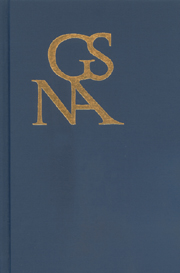Book contents
- Frontmatter
- Contents
- Special Section on Goethe and Idealism
- Introduction—Goethe and Idealism: Points of Intersection
- Goethe and Spinoza: A Reconsideration
- Goethean Intuitions
- Goethe's Notion of an Intuitive Power of Judgment
- “Idealism is nothing but genuine empiricism”: Novalis, Goethe, and the Ideal of Romantic Science
- The Quest for the Seeds of Eternal Growth: Goethe and Humboldt's Presentation of Nature
- Hegel's Faust
- Goethe contra Hegel: The Question of the End of Art
- Goethean Morphology, Hegelian Science: Affinities and Transformations
- Die Gretchenfrage: Goethe and Philosophies of Religion around 1800
- Civic Attachments & Sibling Attractions: The Shadows of Fraternity
- Margarete-Ariadne: Faust's Labyrinth
- Save the Prinz: Schiller's Geisterseher and the Lure of Entertainment
- Walsers Trilogie der Leidenschaft: Eine Analyse seines Goethe-Romans Ein liebender Mann im Kontext der Tradition der Ulrike-Romane
- Review Essay: What's New in the New Economic Criticism
- Book Reviews
“Idealism is nothing but genuine empiricism”: Novalis, Goethe, and the Ideal of Romantic Science
from Special Section on Goethe and Idealism
Published online by Cambridge University Press: 05 February 2013
- Frontmatter
- Contents
- Special Section on Goethe and Idealism
- Introduction—Goethe and Idealism: Points of Intersection
- Goethe and Spinoza: A Reconsideration
- Goethean Intuitions
- Goethe's Notion of an Intuitive Power of Judgment
- “Idealism is nothing but genuine empiricism”: Novalis, Goethe, and the Ideal of Romantic Science
- The Quest for the Seeds of Eternal Growth: Goethe and Humboldt's Presentation of Nature
- Hegel's Faust
- Goethe contra Hegel: The Question of the End of Art
- Goethean Morphology, Hegelian Science: Affinities and Transformations
- Die Gretchenfrage: Goethe and Philosophies of Religion around 1800
- Civic Attachments & Sibling Attractions: The Shadows of Fraternity
- Margarete-Ariadne: Faust's Labyrinth
- Save the Prinz: Schiller's Geisterseher and the Lure of Entertainment
- Walsers Trilogie der Leidenschaft: Eine Analyse seines Goethe-Romans Ein liebender Mann im Kontext der Tradition der Ulrike-Romane
- Review Essay: What's New in the New Economic Criticism
- Book Reviews
Summary
UNLIKE FRIEDRICH SCHLEGEL AND SCHELLING, Novalis did not live in Jena, and thus did not have the opportunity to meet regularly or work closely with Goethe. While the Schlegel brothers often sought out Goethe's friendship and advice and Schelling worked closely with Goethe during his tenure in Jena, Novalis was living in Weißenfels (and Freiberg) and administering the salt mines. In spite of the distance and lack of interaction, Novalis, like many of his young contemporaries, revered Goethe. Unlike his contemporaries, however, Novalis considered Goethe's genius and most important contribution to lie not in his literary work, but in his scientific experiments and writings. In his 1798 essay on Goethe, Novalis refers to Goethe as “der erste Physiker seiner Zeit” (the first physicist of his time), and in the Allgemeine Brouillon (1798–99), Novalis goes so far as to identify his own project with Goethe's: “Göthische Behandlung der Wissenschaften—mein Project” (Goethean treatment of the sciences—my project) (NS 2:640; NS 3:452, Nr. 967).
These claims are at first sight puzzling. Novalis has often been depicted as a poet whose otherworldly attitude evidences little interest in empirical study as practiced by Goethe. Furthermore, Goethe himself criticized Novalis and the romantics for their highly subjective poetry—poetry that did not attempt to express the world but only the self—and, especially toward the end of his life, Goethe sought to distance himself from what he saw as a negative tendency in romanticism.
- Type
- Chapter
- Information
- Goethe Yearbook 18 , pp. 67 - 96Publisher: Boydell & BrewerPrint publication year: 2011

